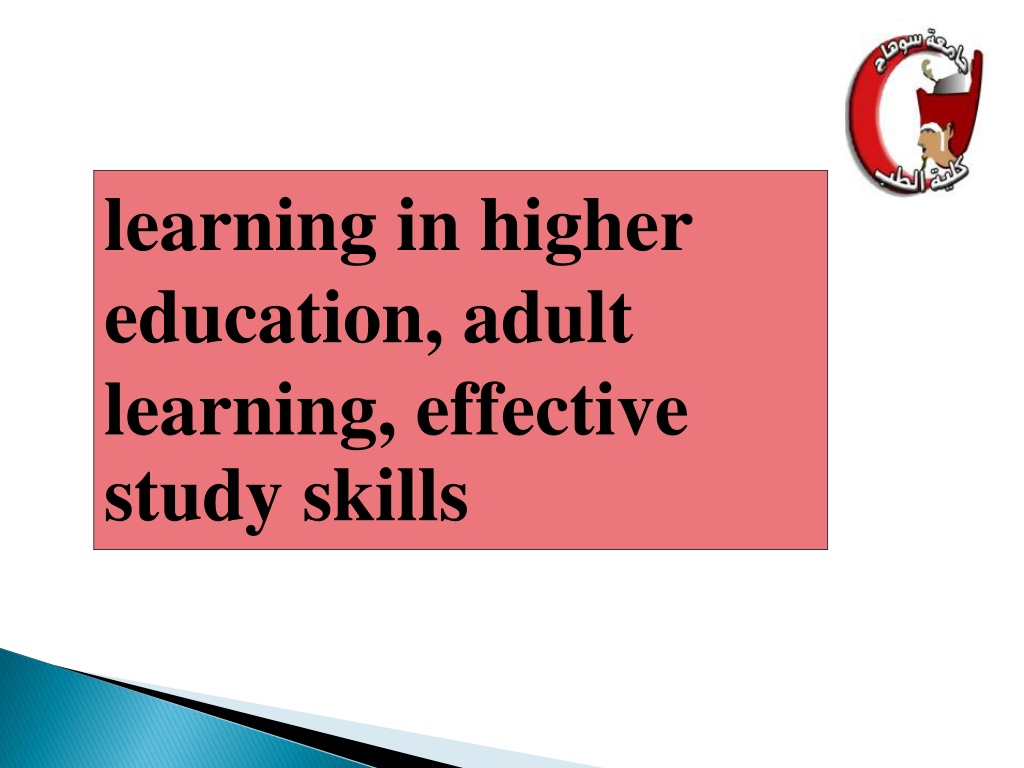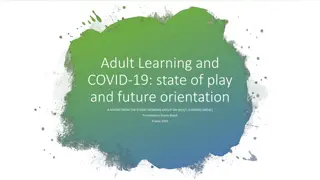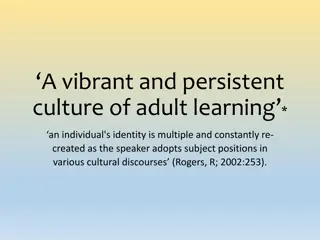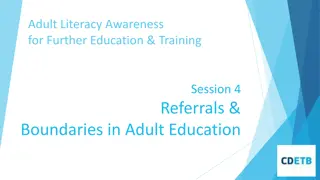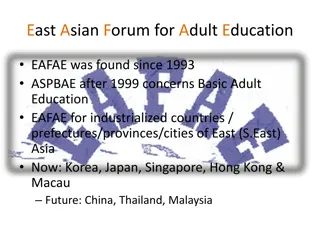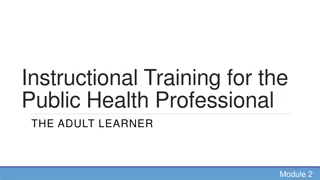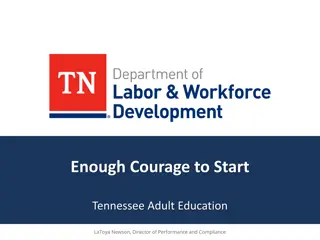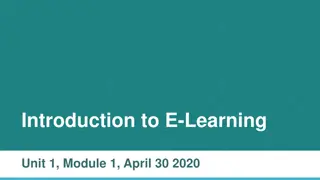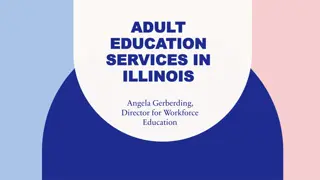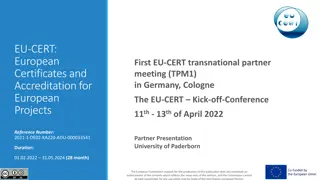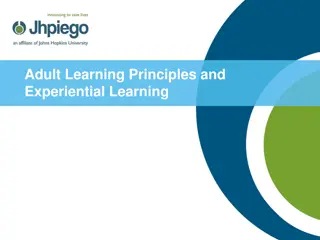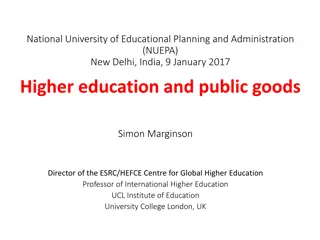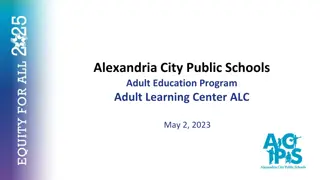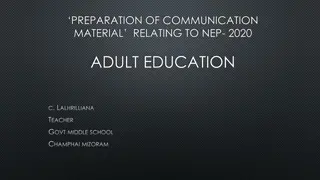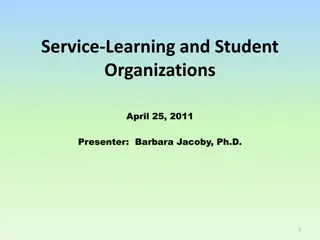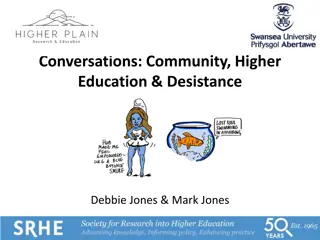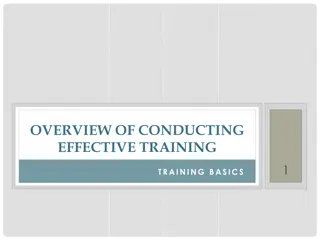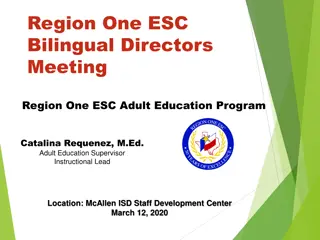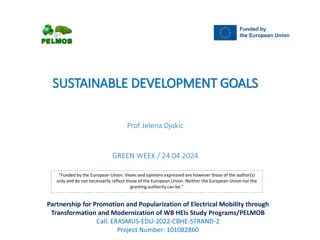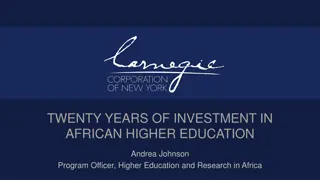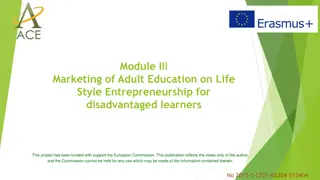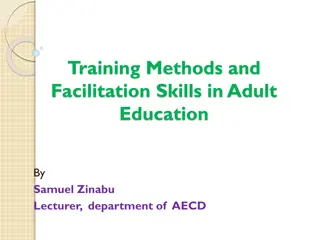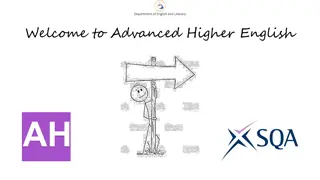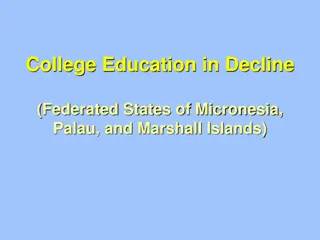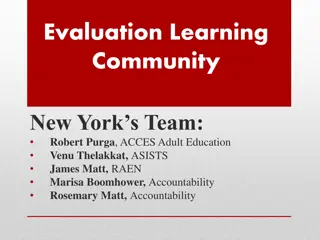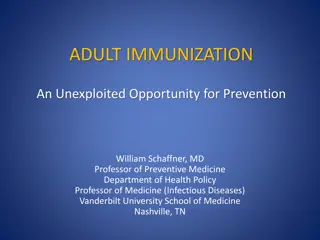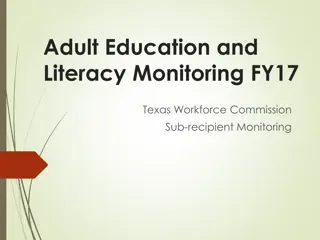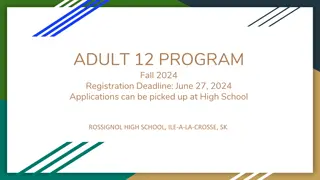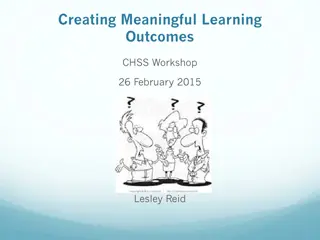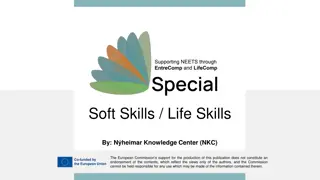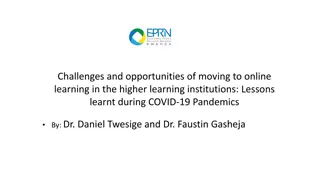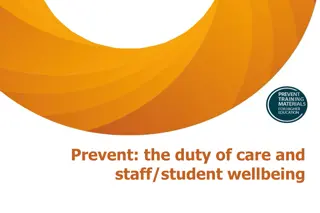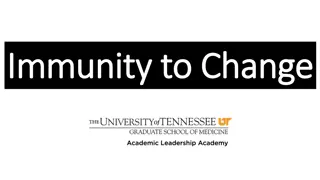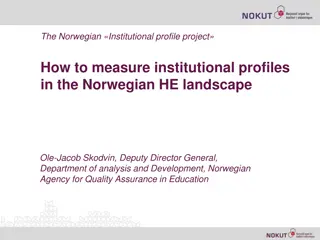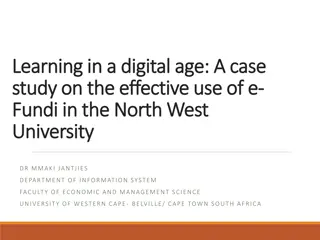Comprehensive Guide to Effective Study Skills and Adult Learning in Higher Education
Explore the National Academic Reference Standards (NARS) for medical education, including strategies for medical school survival, learning techniques, and stress management. Learn about the expectations for graduates in medicine, the development of professional abilities, and the importance of lifelong learning in the field. Gain insights into preparing for medical practice, integrating basic and clinical sciences, and mastering scientific principles. Discover how medical schools ensure students demonstrate essential knowledge, skills, and attitudes before graduation.
Download Presentation

Please find below an Image/Link to download the presentation.
The content on the website is provided AS IS for your information and personal use only. It may not be sold, licensed, or shared on other websites without obtaining consent from the author. Download presentation by click this link. If you encounter any issues during the download, it is possible that the publisher has removed the file from their server.
E N D
Presentation Transcript
learning in higher education, adult learning, effective study skills
Welcome Overview of whole programme NARS Learning to learn Characteristics of Medical School Survival Strategies for Medical School Learning strategies Students, Stress & learning Welcome Overview of whole programme NARS Learning to learn Characteristics of Medical School Survival Strategies for Medical School Learning strategies Students, Stress & learning
National Authority for Quality Assurance and Accreditation of Education (NAQAAE) The National Academic Reference Standards of the expressions of the professional/employment related abilities that graduates in medicine would be expected to have developed during their higher education including associated practice based experiences. National Authority for Quality Assurance and Accreditation of Education (NAQAAE) The National Academic Reference Standards of the MBBCh expressions of the professional/employment related abilities that graduates in medicine would be expected to have developed during their higher education including associated practice based experiences. MBBCh degree include degree include These group wide Sector Universities, Syndicate, Army students These standards group of wide variety Sector Committee Universities, a a representative Syndicate, Ministry Army students standards have of medical variety of Committee of have been academics representing of Egyptian of the representative of Ministry of Hospitals, been developed representing a a Egyptian Universities, the Supreme of the of Health Hospitals, developed by by a a medical academics Universities, Medical Supreme Council the Medical Health and private Medical Council of Medical and Population, hospitals of Population, hospitals private and and . .
National Academic Reference Standards (NARS) National Academic Reference Standards (NARS) Students should be prepared to approach their medical practice acquiring sufficient knowledge of the basic and clinical sciences in an integrated manner, and an understanding of the underlying principles of scientific method. They must be prepared for lifelong learning to remain current in their understanding of the scientific basis of medicine. Students should be prepared to approach their medical practice acquiring sufficient knowledge of the basic and clinical sciences in an integrated manner, and an understanding of the underlying principles of scientific method. They must be prepared for lifelong learning to remain current in their understanding of the scientific basis of medicine. The medical school must ensure that before graduation the student will have demonstrated, to the satisfaction of the faculty, the knowledge and understanding, the intellectual, practical, professional attitude and behaviours, communication, general and transferable skills of the following : The medical school must ensure that before graduation the student will have demonstrated, to the satisfaction of the faculty, the knowledge and understanding, the intellectual, practical, professional attitude and behaviours, communication, general and transferable skills of the following :
1. 1. Attributes of the Graduates of Medical Medicine The Medical Graduate must: Attributes of the Graduates of Medical Medicine The Medical Graduate must: Work to maintain normal health, provide primary health care and deal with common health problems in the society. Work to maintain normal health, provide primary health care and deal with common health problems in the society. Be aware of the importance of a good doctor/ patient relationship, and work to establish and maintain it. Be aware of the importance of a good doctor/ patient relationship, and work to establish and maintain it. Follow rules of medical ethics. Follow rules of medical ethics. Demonstrate appropriate communication, clinical and practical skills. Demonstrate appropriate communication, clinical and practical skills. Show appropriate attitudes and professionalism. Show appropriate attitudes and professionalism. Be prepared for lifelong learning. Be prepared for lifelong learning. Be able to engage in post Be able to engage in post- - graduate and research studies. graduate and research studies. Acquire basic administrative capabilities. Acquire basic administrative capabilities.
2 2. Knowledge and Understanding Normal Human Body: a. Normal structure and function of the body (as an intact organism) and of each of its major systems. b. Molecular, biochemical, and cellular mechanisms which are important in maintaining the body homeostasis. c. Main developmental changes in humans and the effect of growth, development and aging on the individual and his family. d. Basics of normal and abnormal human behaviours. . Knowledge and Understanding Normal Human Body: a. Normal structure and function of the body (as an intact organism) and of each of its major systems. b. Molecular, biochemical, and cellular mechanisms which are important in maintaining the body homeostasis. c. Main developmental changes in humans and the effect of growth, development and aging on the individual and his family. d. Basics of normal and abnormal human behaviours. Altered structure and function of the body and its major systems that are seen in various diseases and integrate it in clinical conditions. Altered structure and function of the body and its major systems that are seen in various diseases and integrate it in clinical conditions. Etiology common and life organ systems, presenting throughout the age spectrum. Etiology, pathogenesis, clinical features, diagnoses and complications of common and life- -threatening illnesses affecting the body and each of its major organ systems, presenting throughout the age spectrum. , pathogenesis, clinical features, diagnoses and complications of threatening illnesses affecting the body and each of its major Principles of management of common and life threatening illnesses including: a. Pharmacological and non pharmacological basics of therapy. b. Non invasive and invasive intervention. c. Basic pre d. Pain relief and palliative care Principles of management of common and life threatening illnesses including: a. Pharmacological and non pharmacological basics of therapy. b. Non invasive and invasive intervention. c. Basic pre- - and post operative care. d. Pain relief and palliative care. . and post operative care.
Population Health and Health Systems: a. The determinants of health, principles of disease prevention and early detection of common community health problems. b. Principle and organization of National Health Care System. c. Epidemiological principles of demography and biological variability. d. Principles of disease surveillance and screening. e. Communicable disease control and health promotion. f. Population and their role in improving medical practice. Population Health and Health Systems: a. The determinants of health, principles of disease prevention and early detection of common community health problems. b. Principle and organization of National Health Care System. c. Epidemiological principles of demography and biological variability. d. Principles of disease surveillance and screening. e. Communicable disease control and health promotion. f. Population- -based approaches to health care services and their role in improving medical practice. based approaches to health care services Basics of ethics, medico legal aspects of health problems, malpractice and common medical errors. Basics of ethics, medico legal aspects of health problems, malpractice and common medical errors. Basics of health and patient and clinical years. Basics of health and patient s safety and safety procedures during practical and clinical years. s safety and safety procedures during practical Principles of clinical audit: current patient care and outcomes against agreed standards of best practice Principles of clinical audit: a a quality Improvement process that measures current patient care and outcomes against agreed standards of best practice quality Improvement process that measures
3 3. Practical and Clinical Skills Graduate should acquire the following practical as well as Clinical skills and competencies during the undergraduate years : Demonstrate basic sciences practical skills relevant to future practice. . Practical and Clinical Skills Graduate should acquire the following practical as well as Clinical skills and competencies during the undergraduate years : Demonstrate basic sciences practical skills relevant to future practice. Take and record a structured, patient Take and record a structured, patient centered centered history. history. Perform full physical examination of patients with acute and chronic clinical conditions appropriate to the age, gender, acute and chronic clinical conditions while being culturally sensitive. Perform full physical examination of patients with acute and chronic clinical conditions appropriate to the age, gender, acute and chronic clinical conditions while being culturally sensitive. Assess the mental state of the patient. Assess the mental state of the patient. Record patients ' data appropriately. Record patients ' data appropriately. Formulate a management plan for common diseases and acute emergencies Formulate a management plan for common diseases and acute emergencies Write safe prescriptions of different types of drugs based on patient's weight, age and health condition Write safe prescriptions of different types of drugs based on patient's weight, age and health condition Provide first aid measures for injured and critically ill patients. Provide first aid measures for injured and critically ill patients.
4. Professional Attitude and Behavioural Skills: Graduates should be able to: 4. Professional Attitude and Behavioural Skills: Graduates should be able to: Adopt an empathic and holistic approach to the patients and their problems. Adopt an empathic and holistic approach to the patients and their problems. Respect patients rights and involve them and /or their caretakers in management decisions. Respect patients rights and involve them and /or their caretakers in management decisions. Understand and respect the different cultural beliefs and values in the community they serve. Understand and respect the different cultural beliefs and values in the community they serve. Recognize the important role played by other health care professions in patients management. Recognize the important role played by other health care professions in patients management. Be aware of and understand the national code of ethics issued by the Egyptian Medical Syndicate. Be aware of and understand the national code of ethics issued by the Egyptian Medical Syndicate. Counsel patients and families suffering from different conditions. Counsel patients and families suffering from different conditions. Recognize one s own limitations of knowledge and skills and refer patients to appropriate health facility at the appropriate stage. Recognize one s own limitations of knowledge and skills and refer patients to appropriate health facility at the appropriate stage.
5 5. Communication skills: . Communication skills: Communicate clearly, sensitively and effectively with patients and their relatives, and colleagues from a variety of health and social care professions. Communicate clearly, sensitively and effectively with patients and their relatives, and colleagues from a variety of health and social care professions. Communicate effectively with individuals regardless of their social, cultural, ethnic backgrounds, or their disabilities. Communicate effectively with individuals regardless of their social, cultural, ethnic backgrounds, or their disabilities. Cope with situations where communication is difficult including breaking bad news. Cope with situations where communication is difficult including breaking bad news. Show compassion to the patients and their relatives in situations of stress and grief. Show compassion to the patients and their relatives in situations of stress and grief. Honor other member of the health profession. Honor and respect patients and their relatives, superiors, colleagues and any other member of the health profession. and respect patients and their relatives, superiors, colleagues and any
6 6. Intellectual Skills: . Intellectual Skills: Integrate basic biomedical science with clinical care Integrate basic biomedical science with clinical care Reason deductively in solving clinical problems: a. Recognize, define and prioritize problems. b. Interpret, analyze, and evaluate information objectively, recognizing its limitations. Reason deductively in solving clinical problems: a. Recognize, define and prioritize problems. b. Interpret, analyze, and evaluate information objectively, recognizing its limitations. Use personal judgment for analytical and critical problem solving and seek out information. Use personal judgment for analytical and critical problem solving and seek out information. Integrate the results of history, physical and laboratory test findings into a meaningful diagnostic formulation. Integrate the results of history, physical and laboratory test findings into a meaningful diagnostic formulation. Construct appropriate management strategies for patients with common diseases, both acute and chronic, including medical, psychiatric, and surgical conditions. Construct appropriate management strategies for patients with common diseases, both acute and chronic, including medical, psychiatric, and surgical conditions. Design an initial course of management for stabilization of patients with serious illnesses. Design an initial course of management for stabilization of patients with serious illnesses.
Classify factors that place individuals at risk for disease or injury, to determine strategies for appropriate response. Classify factors that place individuals at risk for disease or injury, to determine strategies for appropriate response. Retrieve, analyze, and evaluate relevant and current data from literature, using information technologies and library resources, in order to help solve a clinical problem based on evidence (EBM). Retrieve, analyze, and evaluate relevant and current data from literature, using information technologies and library resources, in order to help solve a clinical problem based on evidence (EBM). Recognize and cope with uncertainty that is unavoidable in the practice of medicine by accepting and reacting to uncertain situation through proper counseling and referral Recognize and cope with uncertainty that is unavoidable in the practice of medicine by accepting and reacting to uncertain situation through proper counseling ,consultation and referral ,consultation Involvement into research and scientific methods through: a. Formulation of research questions that is pertinent to medicine. b. Recognition of the importance of precision in collecting, analyzing and interpreting medical data. Involvement into research and scientific methods through: a. Formulation of research questions that is pertinent to medicine. b. Recognition of the importance of precision in collecting, analyzing and interpreting medical data.
7 7. General and Transferable Skills: . General and Transferable Skills: Be prepared for the lifelong learning needs of the medical profession. Be prepared for the lifelong learning needs of the medical profession. Use information and communication technology effectively in the field of medical practice. Retrieve, manage, and manipulate information by all means, including electronic means. Use information and communication technology effectively in the field of medical practice. Retrieve, manage, and manipulate information by all means, including electronic means. Present information clearly in written, electronic and oral forms. Present information clearly in written, electronic and oral forms. Communicate ideas and arguments effectively. Communicate ideas and arguments effectively. Work effectively within a team. Work effectively within a team. Analyze and use numerical data including the use of simple statistical methods). Analyze and use numerical data including the use of simple statistical methods).
5 Thriving during your medical education requires a particular to medical students. 5 Tips for Surviving Medical School Thriving during your medical education requires a particular savviness to medical students. Tips for Surviving Medical School savviness unique unique A A- -Be willing to alter your study routine Be willing to alter your study routine many the many students the deluge students find deluge of find their information directed their past directed their past academic their way academic approaches way. . approaches inadequate inadequate considering considering of information If If this and may identifying stakes Step this happens and begin may seem identifying new stakes are Step and happens to begin experimenting seem terrifying new approaches are lower) and shelf be ready with new in the approaches that lower) will shelf exams to let new approaches the high that work will prevent exams. . to you, you, be let go approaches. . Though high- -pressure work for prevent later ready to your comfortable Though this environment of for you later scrambling comfortable study this experimentation of medical you during scrambling around go of of your study strategies experimentation medical school, first year important milestones strategies experimenting with terrifying in pressure environment during your around important school, (when the milestones like your first year (when the like
B B- - Determine your top priorities outside of school You will give up hobbies, interests, and relationships in medical school, and at times it may feel like you have no identity outside of medicine. Determine your top priorities outside of school You will give up hobbies, interests, and relationships in medical school, and at times it may feel like you have no identity outside of medicine. Are you an avid runner? Resolve to keep running in medical school, but understand that you may not be able to put in the mileage or effort that you did before. Are you an avid runner? Resolve to keep running in medical school, but understand that you may not be able to put in the mileage or effort that you did before. Are you passionate about playing an instrument? Make it a priority to spend an hour a week playing. Worried about staying connected to friends? Prioritize a call or two per month to catch up. Are you passionate about playing an instrument? Make it a priority to spend an hour a week playing. Worried about staying connected to friends? Prioritize a call or two per month to catch up. From the start, aim to hold onto what increasing demands that medicine will place upon you. From the start, aim to hold onto what s most important to cope with the ever increasing demands that medicine will place upon you. s most important to cope with the ever- -
C C- - Resist Everyone And Resist comparing Everyone is is smart And at comparing yourself smart in at times, yourself to in medical will seem to your school. . Everyone like everyone your classmates Everyone is is determined everyone is is doing classmates medical school seem like determined. . better than times, it it will doing better than you you. . When the voice telling you that you re not smart enough, focused, step medical focused, take not only patients moving take a a you into step back medical school, back and school, but and reflect reflect on but that on the that will the unique will serve unique characteristics serve you characteristics that you and that not only got moving forward got you forward. . into and your your patients You out exams, You may out of exams, but may not of the but may not have the park may be have done park. . Or be your done well Or you your history well on may struggle history- -taking on one struggle to taking skills one exam, exam, but to hear skills are but perhaps hear heart are better perhaps you heart murmurs better than you knocked murmurs on than expected knocked another on physical expected. . another physical you may Instead the gotten to peers Instead of the you gotten better? to where peers. . of holding of a a couple better? In where you holding yourself couple weeks, In the you started yourself up weeks, months, the grand started is is more up to months, or scheme of more important to your or years of things, important than your classmates, years ago things, your than your classmates, compare ago. . Have your forward your progress compare yourself Have you forward progress progress relative yourself now learned? Have progress relative relative to now to Have you relative to your to you of you learned? you grand scheme your
D D- - Seek help when you need it Seek help when you need it Many schools have academic support of which can help you adapt your study skills to the rigor of a medical curriculum. Further, student health available to help you sort out any physical or mental health obstacles that stand between you and your education. Many schools have academic support centers of which can help you adapt your study skills to the rigor of a medical curriculum. Further, student health centers available to help you sort out any physical or mental health obstacles that stand between you and your education. centers and peer tutoring available, both and peer tutoring available, both centers and academic deans may be and academic deans may be remember that asking for help when your problem first arises is less likely to have lasting consequences than waiting may have. remember that asking for help when your problem first arises is less likely to have lasting consequences than waiting may have.
E E- - Learn to accept critical feedback and failure Learn to accept critical feedback and failure Medical school notoriously attracts perfectionists and Type A personalities, and if you fall into either difficult to cope with negative feedback or failure during your medical education. Medical school notoriously attracts perfectionists and Type A personalities, and if you fall into either difficult to cope with negative feedback or failure during your medical education. or both or both of these categories, you might find it of these categories, you might find it feedback may be given in a pointed or coarse way, making you feel as though you physician. feedback may be given in a pointed or coarse way, making you feel as though you ve made some terrible mistake that will cost you your future as a physician. ve made some terrible mistake that will cost you your future as a Reframing these negative experiences as opportunities to learn from your mistakes is essential for survival in medical school. Reframing these negative experiences as opportunities to learn from your mistakes is essential for survival in medical school. Instead of viewing setbacks as catastrophic, see them as part of your everyone else Instead of viewing setbacks as catastrophic, see them as part of your everyone else s s and and learning process. learning process. Rest assured that all of your superiors experienced failure as medical students, and that your faults now will build you into a stronger physician later. Rest assured that all of your superiors experienced failure as medical students, and that your faults now will build you into a stronger physician later.
Learning Learning A relatively permanent change in human capabilities that is not a result of growth processes. A relatively permanent change in human capabilities that is not a result of growth processes. Noe Noe, , 2008 2008 Adult Learning Principles Adult Learning Principles Adult learners are different. Adult learners are different.
Learning Is Change Learning Is Change Learning is a change in behaviour or cognitive process. Learning is a change in behaviour or cognitive process. In training it is a change in knowledge, skill or attitude. In training it is a change in knowledge, skill or attitude.
Characteristics of Adult Learners Characteristics of Adult Learners Control over learning. Control over learning.Self responsibility for their lives and decisions and this is why it them to have Self- -direction: direction: Adults Adults feel the need to take feel the need to take s important for responsibility for their lives and decisions and this is why it s important for them to have control over their control over their learning. learning. High motivation to learn: High motivation to learn: Learning in adulthood it it s a personal choice to attend school, in order to improve job skills and achieve professional growth. This motivation is the driving force behind learning Learning in adulthood is usually voluntary. Thus, is usually voluntary. Thus, s a personal choice to attend school, in order to improve job skills and achieve professional growth. This motivation is the driving force behind learning Pragmatic in learning. Pragmatic in learning. Addressing problems logically and practically Learning may be a secondary role. Learning may be a secondary role. Resistant to change: Resistant to change: Less open change. Maturity and profound life experiences usually lead to rigidity, which is the enemy of learning. Less open- -minded minded And therefore more resistant to And therefore more resistant to change. Maturity and profound life experiences usually lead to rigidity, which is the enemy of learning.
Adult learners are more diverse. Adult learners are more diverse. Draw on past experiences in learning: Draw on past experiences in learning: Use personal experience as a resource. Adults to link their past experiences to anything new and validate new concepts based on prior learning. Use personal experience as a resource. Adults have lived longer, seen and done more, have the tendency Learning is often self Learning is often self- -initiated. initiated. Learning is aimed at an immediate goal: Learning is aimed at an immediate goal: High expectations Adult learners that will be useful to their work, expect to have immediate results, seek for a course that will worth their while and not be a waste of their time or money. High expectations Adult learners have high expectations. They want to be taught about things
Kolb's Experiential Learning Cycle Kolb's Experiential Learning Cycle Much of Kolb s theory is concerned with the learner s internal cognitive processes. Much of Kolb s theory is concerned with the learner s internal cognitive processes. Kolb states that learning involves the acquisition of abstract concepts that can be applied flexibly in a range of situations. In Kolb the development of new concepts is provided by new experiences. Kolb states that learning involves the acquisition of abstract concepts that can be applied flexibly in a range of situations. In Kolb s theory, the impetus for the development of new concepts is provided by new experiences. s theory, the impetus for Learning is the process whereby knowledge is created through the transformation of experience Learning is the process whereby knowledge is created through the transformation of experience (Kolb, (Kolb, 1984 1984). ). Kolb's experiential learning style theory is typically represented by a four stage learning cycle in which the learner 'touches all the bases': Kolb's experiential learning style theory is typically represented by a four- - stage learning cycle in which the learner 'touches all the bases':
Processing Continuum (how we approach a task), Perception Continuum (our emotional response, or how we think or feel about it). Processing Continuum (how we approach a task), Perception Continuum (our emotional response, or how we think or feel about it).
1 1. The Program A set of educational courses and activities designed by the institution to determine the systematic learning progress. The program also imparts intended competencies required for the award of an academic degree. . The Program A set of educational courses and activities designed by the institution to determine the systematic learning progress. The program also imparts the intended competencies required for the award of an academic degree. 2 2. Intended Learning Outcomes (ILOs) Subject institution to be gained by the learners completing a particular educational activity. The ILOs emphasize what is expected that learners will be able to do as a result of a learning activity. . Intended Learning Outcomes (ILOs) Subject- -specific knowledge, understanding and skills intended by the institution to be gained by the learners completing a particular educational activity. The ILOs emphasize what is expected that learners will be able to do as a result of a learning activity. specific knowledge, understanding and skills intended by the 3 3. Knowledge and Understanding Knowledge is the intended information to be gained from an educational activity including facts, terms, theories and basic concepts. Understanding involves comprehending and grasping the meaning or the underlying explanation of scientific objects. . Knowledge and Understanding Knowledge is the intended information to be gained from an educational activity including facts, terms, theories and basic concepts. Understanding involves comprehending and grasping the meaning or the underlying explanation of scientific objects.
4 4. Intellectual Skills Learning and cognitive capabilities that involve critical thinking and creativity. These include application, analysis, synthesis and evaluation of information. . Intellectual Skills Learning and cognitive capabilities that involve critical thinking and creativity. These include application, analysis, synthesis and evaluation of information. 5 5. Professional and Practical Skills Application of specialized knowledge, training and proficiency in a subject or field to attain successful career development and personal advancement. . Professional and Practical Skills Application of specialized knowledge, training and proficiency in a subject or field to attain successful career development and personal advancement. 6 6. General and Transferable Skills Skills that are not subject employment, life communication, team work, numeracy, independent learning, interpersonal relationship, and problem solving... etc. . General and Transferable Skills Skills that are not subject- -specific and commonly needed in education, employment, life- -long learning and self development. These skills include communication, team work, numeracy, independent learning, interpersonal relationship, and problem solving... etc. specific and commonly needed in education, long learning and self development. These skills include
Teaching/ Learning Strategies Teaching/ Learning Strategies
Objective structured clinical examination Objective structured practical examination (OSPE) Objective structured clinical examination (OSCE Objective structured practical examination (OSPE) OSCE)
